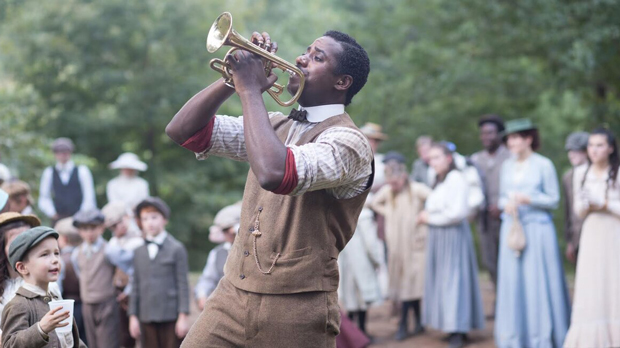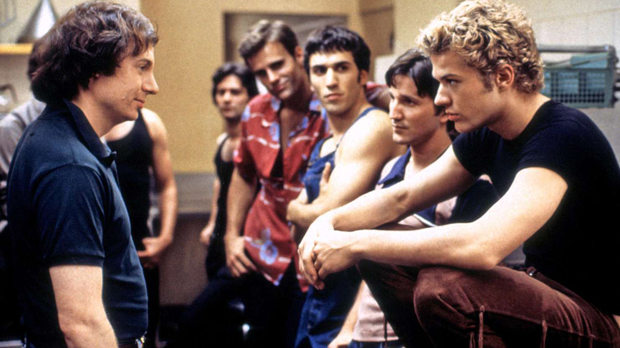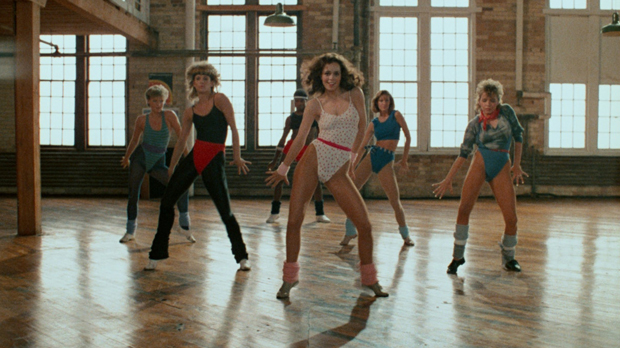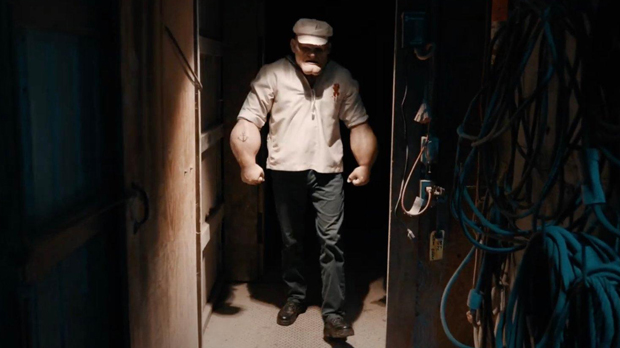 Bolden (2019) The Orchard/Drama RT: 101 minutes Rated R (sexual content, graphic nudity, brutal violence, language, racial epithets, drug use) Director: Dan Pritzker Screenplay: Dan Pritzker and David N. Rothschild Music: Wynton Marsalis, Mark Isham and Scott Steiner Cinematography: Neal Norton Release date: May 3, 2019 (US) Cast: Gary Carr, Erik LaRay Harvey, Yaya DaCosta, Michael Rooker, Ian McShane, Reno Wilson, Robert Ri’chard, Karimah Westbrook, JoNell Kennedy, Breon Pugh, Ser’Darius Blain, Calvin Johnson, Donald Watkins, Korey Webb-Turner, Justin Faulkner. Box Office: N/A
Bolden (2019) The Orchard/Drama RT: 101 minutes Rated R (sexual content, graphic nudity, brutal violence, language, racial epithets, drug use) Director: Dan Pritzker Screenplay: Dan Pritzker and David N. Rothschild Music: Wynton Marsalis, Mark Isham and Scott Steiner Cinematography: Neal Norton Release date: May 3, 2019 (US) Cast: Gary Carr, Erik LaRay Harvey, Yaya DaCosta, Michael Rooker, Ian McShane, Reno Wilson, Robert Ri’chard, Karimah Westbrook, JoNell Kennedy, Breon Pugh, Ser’Darius Blain, Calvin Johnson, Donald Watkins, Korey Webb-Turner, Justin Faulkner. Box Office: N/A
Rating: ***
The opening titles of Bolden inform us that while not much is known about New Orleans-born cornetist Buddy Bolden (1877-1931), he is regarded as the inventor of jazz. It may not sound like much to go on, but I’ve seen movies built on far less than Dan Pritzker’s impressionistic biopic of an immensely talented figure brought down by racism and his own personal demons. Bolden’s story is a true American tragedy.
Despite the efforts of others to erase Bolden’s name from the annals of music history, jazz legend Louis Armstrong publicly credited him for his contribution to music at a concert broadcast over the radio just months before Bolden’s death in a Louisiana mental institution. Bolden opens with this concert. It’s a lively sequence that shows Armstrong (Wilson, Mike & Molly) performing for an all-white audience while a whole bunch of black fans gather outside to listen. The concert triggers something in Bolden (Carr, The Deuce) who can hear the broadcast through the air ducts. It’s late at night and everybody else is asleep. Bolden wanders around in a daze as he takes a journey through his memories. He recalls himself as a young boy lying on the floor under his mother’s sewing machine in the factory where she worked. Even then, he had music in him. Right before his eyes, the women turn into dancers moving in time to the music in his head. It’s a scene worthy of Bob Fosse (All That Jazz). Pritzker utilizes a non-linear narrative in his depiction of Bolden’s life, an intertwining of hazy memories and fever dreams. We’re taken through the rise and fall of his career, his marriage and, ultimately, his descent into drugs and madness.
Bolden plays just like an improvisational jazz piece in how it drifts from one scene to the other in no discernible order. It’s a conceit as frustrating as it is brilliant. Although never dull, the movie leaves the viewer feeling mentally exhausted. A lot of what’s shown is not based on fact. Due to the lack of specific knowledge of his subject’s life, Pritzker takes creative liberties with the details. For example, it’s true there are no known recordings of Bolden. Some of his bandmates claimed that he made at least one phonograph cylinder but it’s never been found. There’s question as to whether it even exists. In the movie, we’re told that the same racist judge (McShane, Hellboy) that had Bolden locked away in the hospital also repressed the recording. This, of course, is pure speculation on the part of the makers.
Carr hits all the right notes as the titular character. It’s not as an easy role to play. The actor has only a broad notion of Bolden as a man and musician. A lot of it is guesswork. Thankfully, he nails it. He hits every high note and low note with equal precision. He shows us Bolden at his best, performing for energetic nightclub crowds dancing and jiving to his music, a then-innovative fusion of ragtime, blues and gospel. He also shows us Bolden at his worst when he begins to realize his career is over courtesy of the powerful white men behind the scenes. It’s a pitch perfect performance.
The music, written, arranged and performed by Wynton Marsalis, is terrific. I’m not an expert on jazz but I like what I heard in Bolden. The cinematography by Neal Norton helps the viewer keep track of what timeline they’re in. His early life is shown in sepia tones while his happier memories are rendered in bright colors. The scenes inside the institution are dark and dreary. The period clothing and sets give Bolden a strong note of authenticity.
My only gripe is that a few shots, like the one of multiple women holding babies when Bolden learns his wife is pregnant, go unexplained. Does this mean he’s already had several children with other women? The movie never tells us this. Then again, it’s not known if he did or didn’t. So much of Bolden’s life is unaccounted for. He never wrote down his music; he always played by ear. I can’t even say for sure if Marsalis based his score on Bolden’s actual music. Bolden is an enigma, one that may never be solved. What we do know is that is his story is sad. He had his demons. He lived in a time when blacks weren’t even second-class citizens. Life didn’t treat him kindly. Given his valuable contribution to the world of music, he should be recognized. Thankfully, Bolden rights a long-unchecked wrong. It’s not perfect but at least it’s something.




